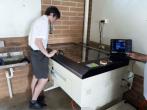STEM (Science, Technology, Engineering, and Mathematics) is an ever-growing field of study that is becoming increasingly popular in Australia. The education system is placing more emphasis on STEM subjects to provide Australian students with the opportunity to compete in the global job market. This article explores the importance of STEM education, career prospects, and the exciting field of robotics.
The Demand for STEM Skills in Australia
- 44% of Australian employers reported difficulties in recruiting STEM-skilled workers in 2020.
- The Australian government has allocated significant funding for STEM education initiatives, with a $1.5 billion investment in the National Innovation and Science Agenda.
- The number of STEM-related job opportunities in Australia is projected to increase by 14% by 2026.
- STEM professionals in Australia earn an average annual salary of approximately $90,000, significantly higher than the national average.
- A survey by the Australian Council of Learned Academies revealed that 75% of Australian employers prefer candidates with STEM qualifications due to their problem-solving and analytical skills.
- The Australian Curriculum integrates STEM education, emphasizing the development of critical thinking, creativity, and collaboration skills among students.
- Employment in STEM occupations is expected to grow at a faster rate than the average for all occupations.
- STEM-related industries in Australia, such as information technology and engineering, have experienced steady growth and contribute significantly to the country's GDP.
Promising Careers in STEM
Pursuing higher education in STEM fields opens up a wide range of rewarding and high-paying job opportunities. Here are some potential careers for STEM graduates:
- Software developers: Designing and developing computer applications and software systems.
- Data analysts: Analyzing and interpreting complex data sets to provide insights and inform decision-making processes.
- Computer systems analysts: Evaluating an organization's computer systems and recommending improvements for efficiency and effectiveness.
- Civil engineers: Designing and overseeing the construction of infrastructure projects, such as bridges, roads, and buildings.
- Biomedical engineers: Applying engineering principles to design and develop medical devices and equipment.
To prepare for these careers, students should pursue higher education pathways that provide the necessary skills and knowledge. While many jobs require at least a bachelor's degree, short-term courses can also help students gain the skills they need for success.

The Exciting Field of Robotics
Robotics is a rapidly evolving field within STEM that offers tremendous potential for Australian students. Here are some key aspects of robotics:
- The robotics industry in Australia is experiencing significant growth, with companies investing in robotics technology to enhance productivity and efficiency.
- Australia had a record number of robot installations in 2020, according to the International Federation of Robotics.
- Robotics automation is revolutionizing industries such as manufacturing, healthcare, agriculture, and mining.
- Robots are employed in manufacturing to automate repetitive tasks, improve production rates, and ensure quality control.
- In healthcare, robots are used for surgical procedures, rehabilitation support, and remote patient monitoring, enabling precise and personalized care.
- Agriculture benefits from robotics with autonomous robots for crop monitoring, harvesting, and precision agriculture, leading to optimized resource utilization and increased yields.
- The mining industry utilizes robotics to enhance safety and efficiency in operations by deploying remote-controlled or autonomous robots in hazardous environments.
- Australian educational institutions and research centers actively engage in robotics research and development, fostering innovation and nurturing future roboticists.
Preparing for a Career in Robotics
Students interested in robotics should pursue STEM education, studying disciplines like computer science, engineering, and mathematics. Participating in robotics competitions, joining robotics clubs, or engaging in project-based learning can provide practical experience and a deeper understanding of robotics principles







